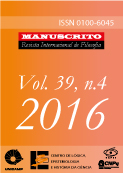Resumo
According to David Lewis, alteration is “qualitative difference between temporal parts of something.” It follows that moments, since they are simple and lack temporal parts, cannot alter from future to present to past. Here then is another way to put McTaggart's paradox about change in tense. I will appeal to my theory of Aspects to rebut the thought behind this rendition of McTaggart. On my theory, it is possible that qualitatively differing things be numerically identical. I call these differing, numerically identical things “aspects.” I will argue that alteration can be a qualitative difference between temporal aspects of something that lacks temporal parts. So a moment can alter in tense. By rejecting Lewis's assumption my theory can solve this version of McTaggart's paradox.Referências
ANNAS, J. ed. Voices of Ancient Philosophy: An Introductory Reader, New York: Oxford University Press, 2001.
BÄCK, ALLAN “Syllogisms with Reduplication in Aristotle,” Notre Dame Journal of Formal Logic, XXIII, pp. 453-58, 1982.
BAXTER, D. “Many-One Identity,” Philosophical Papers, XVII, pp. 193-216, 1988.
BAXTER, D.“Identity through Time and the Discernibility of Identicals,” Analysis XLIX, pp. 125-131, 1989.
BAXTER, D. “The Discernibility of Identicals,” Journal of Philosophical Research XXIV, pp. 37-55, 1999.
BAXTER, D. “Instantiation as Partial Identity,” Australasian Journal of Philosophy LXXIX, pp. 449-464, 2001.
COTTINGHAM, J., STOOTHOFF, R., and MURDOCH, D. The Philosophical Writings of Descartes. Cambridge: Cambridge University Press, 1984.
DESCARTES, R. Third and Fourth sets of replies, in Objections and Replies. In Cottingham, J., Stoothoff, R., and Murdoch, D. (trans.) (1984), pp. 121-137 & 154-178.
HUME, D. An Enquiry concerning Human Understanding, ed. T. Beauchamp, Oxford: Clarendon Press, 2000.
JACKSON, F,. and PRIEST, G. Lewisian Themes: The Philosophy of David K. Lewis. Oxford: Oxford University Press, 2004.
LEWIS, D. “The Paradoxes of Time Travel,” American Philosophical Quarterly XIII, pp. 145-52, 1976.
LEWIS, D. On the Plurality of Worlds, Oxford: Basil Blackwell, 1986.
MCDANIEL, K. "Extended Simples and Qualitative Heterogeneity," The Philosophical Quarterly XXX, p. 325-331, 2009.
MCTAGGART, J. The Nature of Existence, Vol. 2, Cambridge: University Press, 1927.
PARSONS, J. "Distributional Properties." In Jackson, F. and Priest, G. (eds.) (2004), pp. 173-80.
PLATO. Republic. Transl. by G. M. A. Grube, Indianapolis, IN: Hackett, 1974.
SARTRE, J.-P. L'Être et le néant. Paris: Librairie Gallimard, 1943. Being and Nothingness. Trans. By H. Barnes, New York: Washington Square Press, 1984.
SCHAFFER, J. "Monism: The Priority of the Whole," Philosophical Review
CXIX, pp. 31-76, 2010.
TARSKI, A. Introduction to Logic. New York, 1941.
WIGGINS, D. Identity and Spatio-Temporal Continuity. Oxford, Blackwell, 1967.

